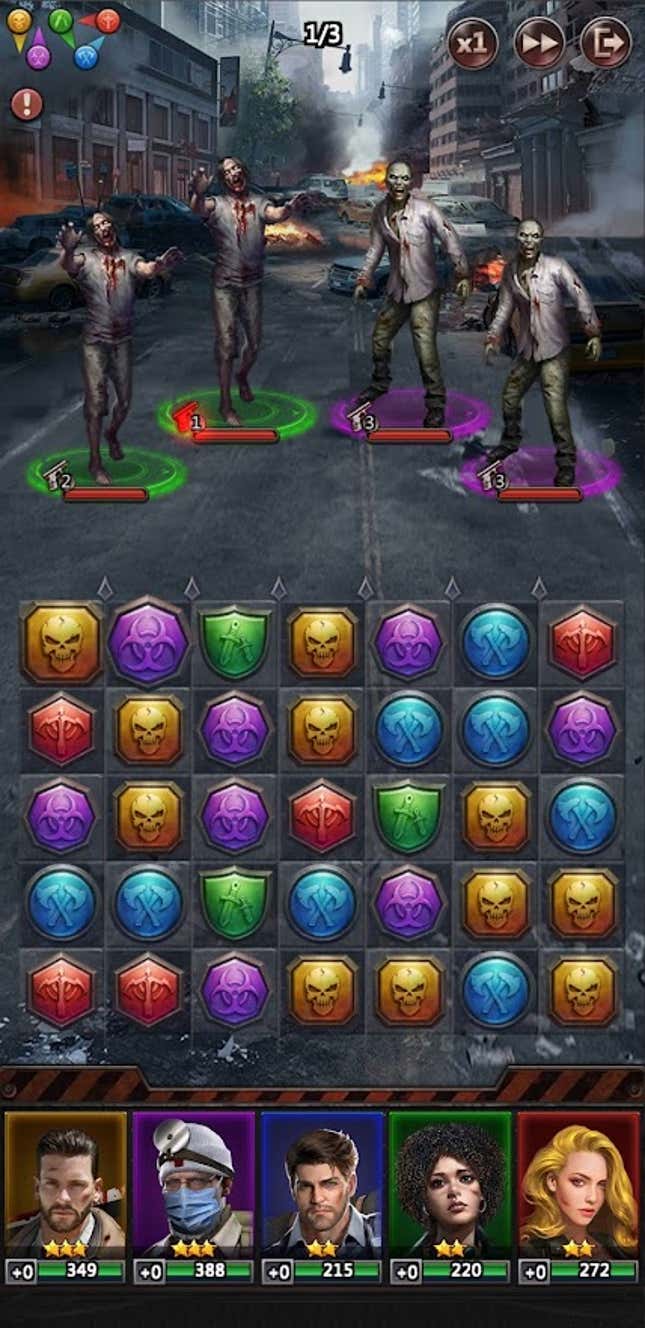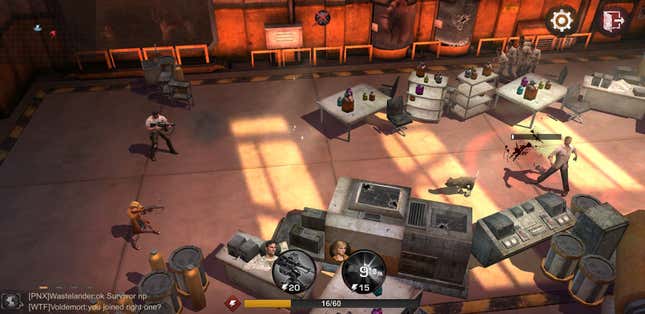If you’ve ever logged into Twitter, Instagram or some other social media platform that can track your interests lately, you’ve most likely seen two things. One, a ton of depressing news because that’s just the world right now. And two, you’ve likely seen those weird ads for some zombie game or other. While most people probably just scroll right past these ads, maybe shaking their head or chuckling, I decided to actually give these games a shot. What I found was just as weird as the ads plastered all over Twitter.
While there are many zombie-themed mobile games, the two titles that I see the most are State of Survival and Puzzles & Survival. Let’s look at one of the weirder ones first. This ad for Puzzles & Survival features a man in prison getting bit by a zombie rat. This rodent’s bite then causes the man to become a zombie, but not before his cellmate escapes.
In another ad, this time for State of Survival, a woman in an elevator gets her ass slapped by another woman. But the groping gets blamed on a different dude who is also in the elevator with them, so he gets slapped in return. (Nothing like this happens in the game, by the way.)
If you haven’t seen the ads above, chances are still good that you’ve seen some variation of them. There are So. Many. More. Weird. Zombie. Game. Ads. Few of them make complete sense, and ultimately, searching for logic in these commercials is as big of a waste of time.

While these two share similar ads and even nearly identical names, they are very different games in action. State of Survival and Puzzles & Survival both feature base-building mechanics, forcing you to slowly upgrade buildings and farms to grind resources so you can eventually upgrade your main headquarters. You then repeat the whole process over again. Where they differ is in what you do between the mind-numbingly dull town management sequences.
In Puzzles & Survival, you play a tile-matching puzzle game where you defeat hordes of zombies by sliding pieces around and making big combos. Likely you’ve played a variation of this mechanic at some point or another, but in a better form. That’s not to say games need to always be fresh or innovative to be good, but the gameplay in Puzzles & Survival is a major grind. Playing the puzzles is a pain because the noises during gameplay sound crunchy and often get jumbled together during big combos. The zombies, the stars of the action, are barely animated—same thing for the puzzle animations. And you have to sit through all of that unpleasantness for an extended period of time just to unlock puzzles that aren’t engaging to play. All the incentives to keep going fall flat.
State of Survival, on the other hand, doesn’t use puzzles. Instead, it features straightforward and nearly hands-off combat. Your squad of survivors shoots without your input. All you do is activate their limited special abilities when they have killed enough of the living dead to fill the meter. Idle games like AdVenture Capitalist and Cookie Clicker can be fun, particularly for watching numbers get bigger. But those games smartly design around the waiting mechanics, while State of Survival just does its thing. When you do get to use a special ability, it doesn’t actually feel worth the wait. The specials also feel too powerful, making fights easy to complete without much chance of failure. The poorly animated combat isn’t fun to watch either and only rewards you with a pitiful amount of resources that barely help you make a dent in the grind towards unlocking more content. It got old after about twenty minutes.

In a way, the ads getting the word out on these games are brilliant. There is no way you can get a bunch of folks to download and care about your Puzzles & Dragons knock-off simply using gameplay footage of it. Instead, you hook people by creating outlandish cutscenes and ridiculous premises that catch the eye regardless of your tastes.
While you could make the argument that it’s misleading advertising, as Vice reported a few years ago, the law hasn’t quite caught up to the realities of mobile game advertising. In a later report by NYMag, a developer for a different game explains that in their case, a completely separate team creates the ads—which are of course aiming for virality. In that particular case, though, while there’s a gap between what the ads show and what the game actually is, folks who download after watching are rewarded with a narratively rich experience that touches on mature themes.
That’s not what you’ll find in these zombie games. I’m assuming that most folks will likely either be entertaining by the ads and move on, scroll straight past, or end up uninstalling the game even if they go through with it. But the model described in the Vice report says that most of the time, mobile games like this don’t need a big userbase. What they’re looking for are extremely dedicated fans who are willing to drop a lot of money, otherwise known as ‘whales.’ The more viral the ads, then, the more likely it is that they’ll reach people who could fit that demographic.
In action, most of the zombie games with wild ads are fairly boring, gameplay-wise, and often play like hundreds of other phone games. I know this because I play and like a bunch of mobile games. I’m pretty cool with playing GEMCRUSHWARSDASHPUZZLE while waiting for food to arrive, for example. But Zombie Survival and Puzzles & Survival are stiff and soulless. They come off as if a group of robots looked at the most popular free games of the last five years and then spat something out based on those trends. And despite trying to emulate some of the most popular mechanics around, there’s little sense that the game understands what made the things work in the first place.
Then again, I’ve written *checks word count* over 950 words about these silly zombie games on Kotaku.com entirely because these ads are so bonkers. I’d say that’s an effective way to get people talking and playing your game in 2021.